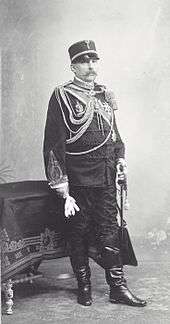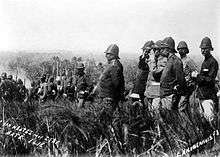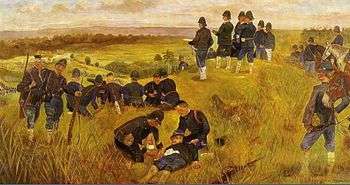J. B. van Heutsz
Joannes Benedictus van Heutsz (3 February 1851 – 11 July 1924) was a Dutch military officer who was appointed governor general of the Dutch East Indies in 1904. He had become famous years before by bringing to an end to the long Aceh War.
Joannes Benedictus van Heutsz | |
|---|---|
._Gouverneur-generaal_(1904-09)_Rijksmuseum_SK-A-3814.jpeg) Portrait of J. B. van Heutsz by Hannké (1908) | |
| Nickname(s) | "Pacificator of Aceh" |
| Born | 3 February 1851 Coevorden, Drenthe, Netherlands |
| Died | 11 July 1924 (aged 73) Montreux, Switzerland |
| Allegiance | Dutch |
| Commands held | Governor-general of the Dutch East Indies |
| Battles/wars | Aceh War |
| Spouse(s) | Maria Henriëtte van der Zwaan |
| Children | 4 |
Early life and education
Joannes Benedictus van Heutsz was born on 3 February 1851 in Coevorden in the Netherlands. He was the second son of Joannes Franciscus van Heutsz and Maria Lucilla Kocken. Both his father and grandfather were artillery officers.[1][2]
Van Heutsz, who was a difficult and talkative student, went to school in Breda. His family could not afford to send him to the Royal Military Academy in Breda, so he later went to the Instruction Battalion in Kampen from 1867 to 1872.[1][2]
Aceh War

Following twenty-five years of protracted warfare, Van Heutsz was appointed as Military Governor of Aceh.[3] In consort with the Islamic scholar Christiaan Snouck Hurgronje, Van Heutsz succeeded in weakening the Acehnese resistance by exploiting tensions between the Acehnese aristocracy and the religious ulama. He also solicited the support of the Acehnese ruling classes while isolating the rebels from their rural bases. At the advice of an Acehnese noble, he also altered the tactics of the Royal Dutch East Indies Army by introducing small mobile forces which were successful against the guerrilla tactics of the Acehnese.[4]
Van Heutsz commissioned Colonel Van Daalen with the challenge of breaking any remaining resistance. Van Daalen destroyed several villages, killing at least 2,900 Acehnese, among which were 1,150 women and children. Dutch losses numbered just 26, and Van Daalen was promoted. By today's standards, these actions would be considered war crimes.[5][6] By 1903, Van Heutsz tactics had succeeded in convincing several secular Acehnese resistance leaders including Sultan Muhammad Daud, Tuanku Raja Keumala, Tuanku Mahmud and Teuku Panglima Polem Muda Perkasa to surrender to the colonial authorities.[3] Having overcome the secular elements of the resistance, Aceh was declared by the Dutch to be officially pacified by 1903.[4] Despite this, resistance from the ulama continued until 1913.[3]


Hendrikus Colijn, future Prime Minister of the Netherlands, was the adjutant of Van Heutsz. In the Netherlands at the time, Van Heutsz was considered a hero, named the 'Pacificator of Aceh' and was promoted to the position of Governor-General in 1904.[4] His efforts boosted support for imperialism in Dutch society and government while weakening the position of anti-imperialists.[4]
Return to Europe

Van Heutsz moved to Amsterdam in 1909. After his wife died in 1919, he moved to Bussum. He lived in Montreux in Switzerland and Merano in Italy from 1922. He died in Montreux on 11 July 1924, at the age of 73. On 9 June 1929, he was reburied in Amsterdam.[1][2]
Legacy
Monument

During the 1920s and 1930s, monuments to Van Heutsz were erected throughout the major cities of the Netherlands and the Dutch East Indies including Amsterdam, Banda Aceh and Batavia.[4] On 15 June 1935, The Van Heutsz Monument in South Amsterdam (Amsterdam-Zuid) was inaugurated by Queen Wilhelmina. The monument underwent many defacements several times during various protests from 1965 to 2004. The municipality of Amsterdam changed its name and purpose in 2004. The monument is now known as the Dutch East India – Netherlands Monument (Monument Indië-Nederland), and all references to Van Heutsz have been removed.
Regiment van Heutsz
After the departure of the Dutch from independent Indonesia in 1949, the Regiment van Heutsz of the Dutch Army was created with the specific aim of being "the bearer of the traditions of KNIL" (the former Dutch Indies colonial army which had carried out the Aceh War).
Awards and decorations
- Kraton Medal
- Knight First Class of the Military Order of William (1876)
- Honorary Sabre participants for their bravery (26 June 1890)
- Commander of the Military Order of William (1899)
- Knight of the Order of the Dutch Lion (1899)
- Grand Officer of the Military Order of William (1901)
- Grand Cross of the Military Order of William (1903)
- Grand Officer of the Order of Orange-Nassau
- Grand Cross of the Order of the Dutch Lion (4 December 1919)
- Expedition Cross with two clasps
- Long Service Medal for Officers
- Grand Cross of the Order of the Red Eagle
Notes
- (in Dutch) F. G. P. Jaquet, Heutsz, Joannes Benedictus van (1851-1924), Biografisch Woordenboek van Nederland, 2013. Retrieved on 18 January 2015.
- (in Dutch) Maurice Blessing, Jo van Heutsz (1851-1924), Historisch Nieuwsblad, 2006. Retrieved on 18 January 2015.
- Ibrahim (2001), p. 133
- Vickers (2005), p. 13
- de Wijk, Rob (2003). "The limits of military power". In Lennon, Alexander T. (ed.). The battle for hearts and minds: using soft power to undermine terrorist networks. MIT Press. pp. 5–6. ISBN 978-0-262-62179-3.
- Levene, Mark (2005). Genocide in the Age of the Nation State: The rise of the West and the coming of genocide. I.B. Tauris. p. 260. ISBN 978-1-84511-057-4.
References
- J.B. van Heutsz - "The Pacifier of Aceh" 1851-1924 on YouTube
- The Aceh War 1873-1914 on YouTube
- Ibrahim, Alfian. "Aceh and the Perang Sabil." Indonesian Heritage: Early Modern History. Vol. 3, ed. Anthony Reid, Sian Jay and T. Durairajoo. Singapore: Editions Didier Millet, 2001. 132-133
- Reid, Anthony (2005). An Indonesian Frontier: Acehnese & Other Histories of Sumatra. Singapore: Singapore University Press. ISBN 9971-69-298-8.
- Vickers, Adrian (2005). A History of Modern Indonesia. New York: Cambridge University Press. pp. 10–13. ISBN 0-521-54262-6.
External links

| Political offices | ||
|---|---|---|
| Preceded by Willem Rooseboom |
Governor-General of the Dutch East Indies 1904–1909 |
Succeeded by Alexander Willem Frederik Idenburg |